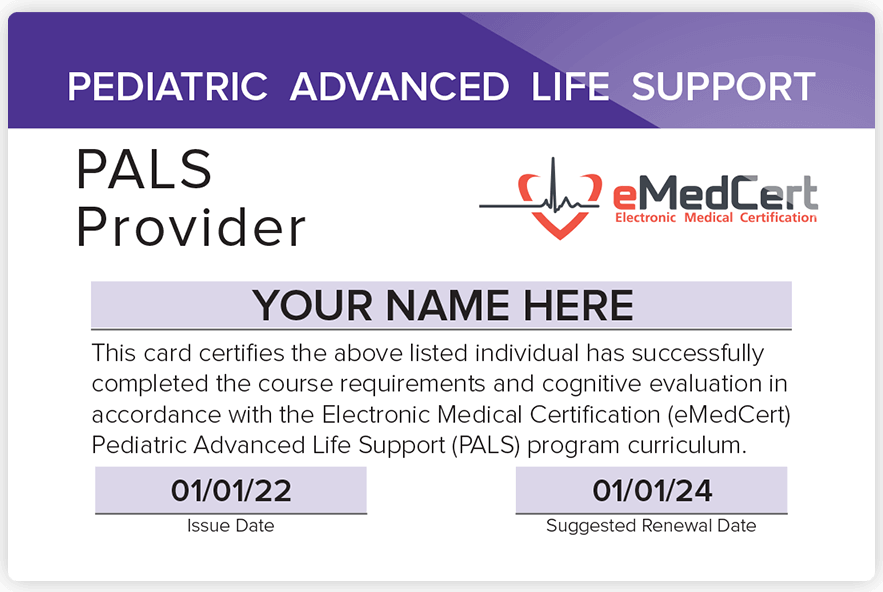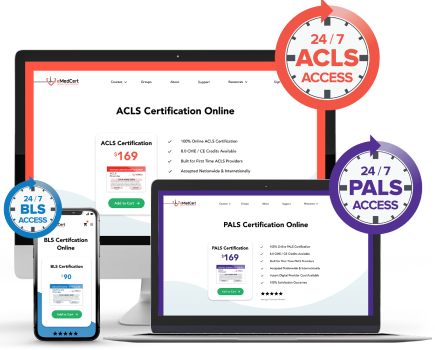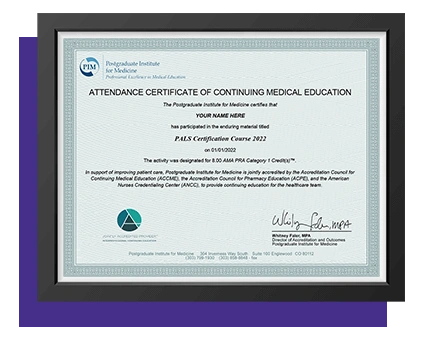PALS License
PALS Certification

Discover the importance of a PALS license and why it’s crucial for pediatric care. Learn how to get PALS certified online with our convenient, flexible, and cost-friendly PALS courses. Sign up now and get your PALS license by the end of the day!

The Efficient, Affordable Way to Certify
The eMedCert Online PALS (Pediatric Advanced Life Support) Certification course is built specifically for the demanding lifestyle required of 21st century medical students and healthcare professionals. Our 100% online course gives you control of your PALS Certification – take it when you want, where you want, and at your own pace. Complete your course with efficiency from your desktop, tablet, or smartphone.
Credible and Affordable PALS Certification
Our Pediatric Advanced Life Support (PALS) training is accredited through our partnership with the Postgraduate Institute for Medicine (PIM) and also by the California Board of Registered Nursing (CA BRN). We provide AMA, ANCC, ACPE, and ADA continuing education credits, redeemable upon completion of the PALS Certification course.
eMedCert and our PALS materials undergo routine audits by regulatory organizations and 3rd-party clinical teams. Our internal medical team continuously works to ensure compliance, accuracy, and integrity.

Ready To Begin?
Complete your registration and begin reviewing your material in less than two minutes. Certification has never been this easy!
Online PALS Certification Details
Our PALS Certification course is designed to deliver the best online certification experience that can accompany your busy schedule.
- Start When Ready -- No Time Limit -- Available 24/7
- Finish in a Single Sitting or Save Your Progress and Return Later
- Achieve a Passing Score –– 80% or Higher (40 Correct / 50 Total Questions)
- Instant Exam Results & Unlimited Exam Retakes
- No On-Site Skills Check Required
- Digital PALS Provider Card Available Immediately for Download
- 8.0 AMA, ANCC, ACPE or ADA CME Credits Available
Trusted By:





PALS License
A Pediatric Advanced Life Support (PALS) license is a life support certification. A PALS certification course gives medical professionals a thorough grasp of essential skills and optimal approaches to assist children facing life-threatening emergencies.
Unlike other types of life support certifications, such as Basic Life Support (BLS) certification and the Advanced Cardiac Life Support (ACLS) certification, PALS certification mainly focuses on providing crucial care to infants and children critically ill or injured. Therefore, obtaining a PALS certificate is essential for pediatric care. While the ACLS and PALS certification courses teach healthcare providers the same general concepts, ACLS and BLS training is more geared towards treating adults who require medical care. On the other hand, PALS training focuses on delivering essential care to pediatric patients, infants, and children.
The specific training that goes towards becoming PALS certified is critical, as symptoms of a medical emergency will often present quite differently in pediatric patients than in adult patients. Similarly, the approach for treating medical emergencies in pediatric patients is often quite different from treatment protocols for adults.
PALS certification may be a requirement for healthcare providers who have the potential to care for pediatric patients. This includes nurses, emergency medical technicians (EMTs), and other medical care professionals in intensive care and emergency medicine.
A PALS license enables healthcare providers to provide quality care to infants and children facing life-threatening medical emergencies. Such medical emergencies include, but are not limited to, cardiac and respiratory events and shock. PALS certification also proves the competency of healthcare professionals in providing high-quality care after the resuscitation of a pediatric patient.
The training to obtain a PALS license helps healthcare providers to enhance critical thinking and problem-solving skills. The course also helps to cultivate and improve critical teamwork skills that contribute significantly towards the entire team providing better care to pediatric patients.
What is PALS?
Pediatric Advanced Life Support (PALS) focuses on medical emergencies in infants and children, teaching healthcare providers how best to respond to these emergencies.
PALS equips healthcare providers with the knowledge and skills to treat pediatric patients more specifically. This is in cognizance of the fact that the bodies of infants and children respond differently from those of adult patients, especially in life-threatening medical emergencies.
Seeking a PALS license and going through the training will be most beneficial for healthcare providers who specifically need or want to develop their ability to respond to cardiopulmonary emergencies in pediatric patients. Healthcare providers who work in childcare settings, pediatric medical facilities, and advanced pediatric care facilities are the candidates who will benefit the most from being PALS-certified. As mentioned above, many positions may require candidates to have a PALS license.
PALS teaches responses to the following critical pediatric cardiopulmonary incidents or emergencies:
- Cardiac arrest
- Respiratory arrest
- Abnormal heart rhythms/arrhythmia
- Shock
In addition to these core life-saving concepts and treatment algorithms, healthcare providers undergoing PALS training learn non-medical skills, primarily teamwork and communication skills. Healthcare providers learn to communicate effectively as leaders and members of a resuscitation team attending to a pediatric patient.
If you’re wondering how to get PALS-certified, several online PALS courses are a great option for those who are able to obtain their PALS certification online. Individuals considering signing up for a PALS course online should have a basic understanding of practical pediatric assessment, relevant treatment algorithms, resuscitation, and team dynamics.
Even in understanding what PALS is, it is essential to reiterate that the ultimate goal of the course and certification is to improve pediatric outcomes. The competency acquired during PALS training ensures healthcare providers can deliver the highest level of care, preventing a poor prognosis and effectively minimizing the number of preventable deaths in pediatric patients following cardiopulmonary emergencies.
PALS Training
Pediatric Advanced Life Support training is designed to equip healthcare providers to assess, recognize, and deliver essential care to pediatric patients who are critically ill or experiencing injury.
Topics covered in PALS class are related to pediatric life support and include the following:
- Timely recognition of cardiac and respiratory emergencies and early intervention by applying cardiopulmonary resuscitation (CPR)
- Pediatric assessment in a systematic approach
- Recognition of respiratory and circulatory emergencies that do or do not require immediate intervention
- High-quality and effective CPR
- Team dynamics and how to communicate effectively during a pediatric CPR
- Post-resuscitation management
- Effective respiratory/airway management
- Early interventions for effective shock management
- Clinical characteristics of cardiac arrest rhythms and differentiating between stable and unstable pediatric patients with arrhythmia
- How to select and administer appropriate medication and electrical therapies, such as using an automated external defibrillator (AED) when handling an arrhythmia scenario
PALS training equips healthcare providers with the knowledge and skills to assess pediatric emergencies and how to intervene and treat pediatric respiratory and cardiac emergencies. The training also extends to how to care for pediatric patients after they have received the appropriate emergency care.
Healthcare providers can have complete control of their PALS training. Electronic Medical Certification (eMedCert) is a top-tier trainer offering fully-online training. Candidates can take the PALS class when they want, where they want, and at their own pace. Candidates can also access the user-friendly training platform from a smartphone, tablet, or desktop.
eMedCert’s Pediatric Advanced Life Support training program is fully accredited, and the training material is routinely audited by accrediting bodies to ensure accuracy, integrity, and compliance. Our PALS course was created and frequently reviewed by licensed medical professionals and is structured to cater to the hectic lifestyle of today’s modern medical professionals. These include, but are not limited to, nurses, EMTs, physicians, physician’s assistants, anesthesiologists, and other specialists.
PALS Certification
It is critical for healthcare providers to consider the knowledge and skills they seek as well as a complete understanding of what is a PALS certification. This will clarify whether a PALS license is the proper emergency response certification to pursue from the many available options.
PALS certification provides proof of knowledge in the areas of pediatric health assessment, treatment algorithms and interventions, life support procedures, and professional team dynamics. These areas define the criteria one must meet to get a PALS license.
eMedCert’s PALS certification cost of $169 is one of the cheapest PALS courses online. After signing up, candidates get 24/7 access to the course, which is available on multiple platforms. In addition to interactive training materials, our online PALS certification candidates can also access PALS exam practice questions. Candidates get unlimited exam retakes, as well.
After completing the final online PALS certification exams, candidates can access their exam results instantly. The digital PALS provider card is also immediately available for download upon attaining a passing score. A hard copy of the provider card is mailed to the successful candidates, typically within a window of 2-5 business days.
Renew PALS
The PALS license expires two years after the date it was issued. Healthcare professionals with a PALS certificate are required by the accreditation bodies to renew their PALS certificate every two years following the expiration of the original certificate.
When providers renew PALS, it must be in compliance with the accreditor’s requirements. Additionally, taking the recertification course allows healthcare providers to update their knowledge base and skillset with the latest and relevant PALS procedures and algorithms.
PALS recertification is generally more straightforward than getting an initial PALS certificate. This is because the course for license renewal consists primarily of reviewing information and procedures. Many providers can finish the PALS renewal course in just a few hours.
eMedCert’s compact and up-to-date PALS recertification online course is available for all providers with a PALS certificate, regardless of whether the certificate is still active or expired. Healthcare providers can renew PALS online with eMedCert and enjoy the convenience of completing the course 100% online at a market-competitive rate of $119.
PALS Certification for Nurses
PALS certification for nurses ensures they are familiar with the latest pediatric care guidelines and best practices. Knowing they can provide their patients with the highest level and quality care inspires nurses' confidence as they treat pediatric patients. PALS for nurses is also essential in boosting the confidence of parents and guardians. It assures the parents and guardians of pediatric patients that their children are indeed in the safest and most capable hands in the event of an emergency.
Employers may also require that prospective employees have this certification in order to be employed. It’s a way for healthcare facilities to know that job applicants are up-to-date with the latest relevant guidelines on pediatric care. Therefore, PALS nursing candidates may have an added advantage and are, in some cases, the preferred choice over other applicants who are not PALS-certified.
To summarize, nurses who have the potential to respond to pediatric emergencies should complete the course and get a PALS license so they are fully equipped to deliver the best care. Certified nurses are better prepared for a wide range of threats and can respond much faster and more confidently.
Nurses with a PALS certification can also utilize it to access and pre-qualify for more job opportunities where the potential employer sets the certification as a requirement. Even if it’s not a requirement for the job, a PALS license on the resume can tip the scales for a nurse as it shows their commitment to offering the best pediatric care.